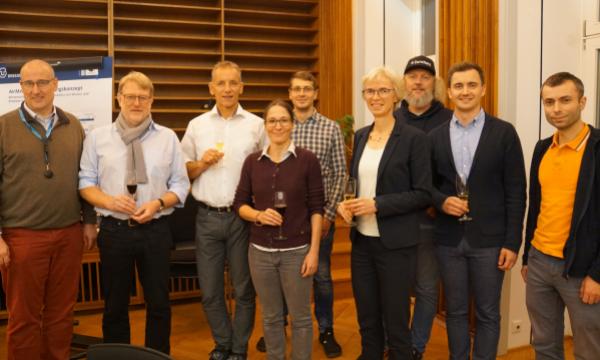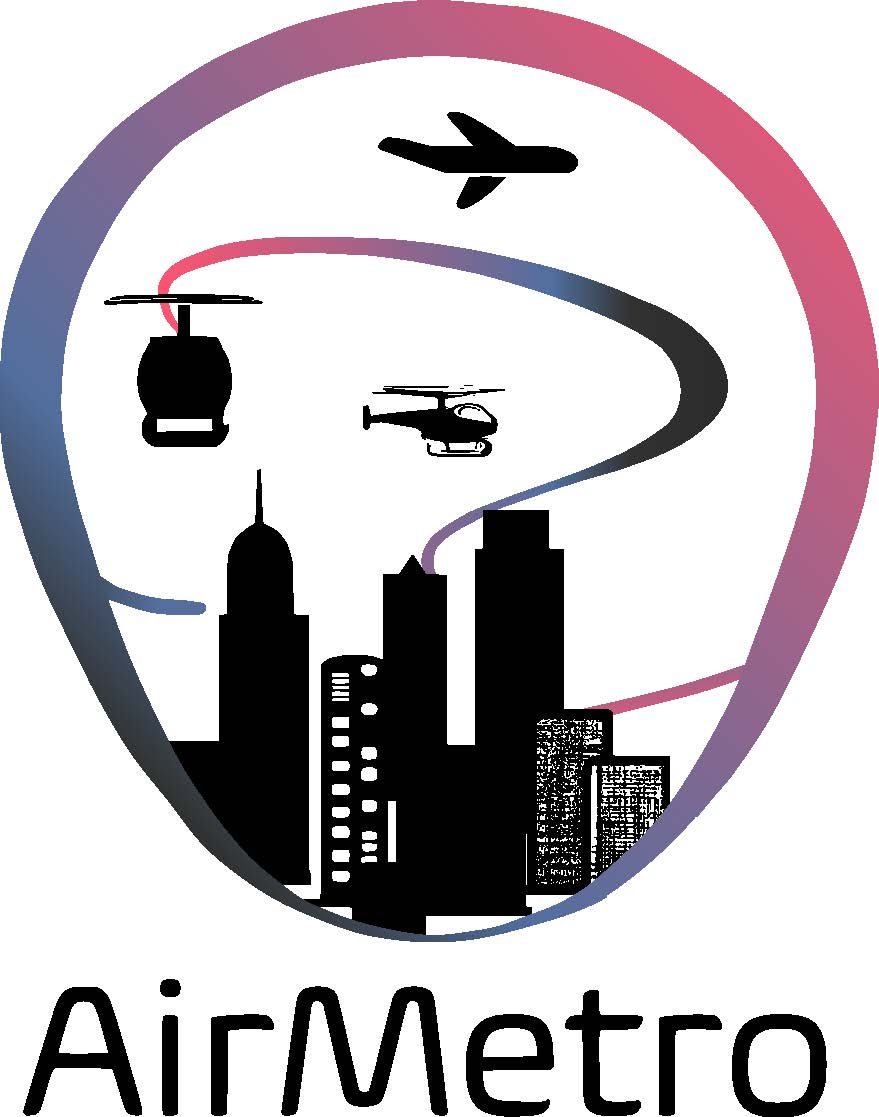
You are here
Researching the mobility of the future
Rethinking urban and regional mobility: Interdisciplinary research into the framework conditions and requirements of socially acceptable advanced air mobility implementation.
Flying taxis and freight transporters criss-crossing the sky at different levels, gliding through urban canyons and streets. In the 1997 film "The 5th Element", this was still science fiction. From 2024, the scientific foundations for real-life transport scenarios of this kind will be laid at TU Dresden (TUD). The new DFG Research Training Group (RTG) at TU Dresden on the "Technical and Operational Integration of Highly Automated Aviation in Urban Areas" (RTG 2947) will focus on so-called "Advanced Air Mobility" (AAM) and its necessary technical and social framework conditions. AAM is seen as an air transport system of the future that, according to the National Aeronautics and Space Administration (NASA), "...transports people and freight between places that were previously not or only insufficiently served by aviation - local, regional, intraregional, urban..." and that "...using revolutionary new aircraft that are only now becoming possible."[1
Five TUD faculties, DLR involvement, eleven research topics, 33 doctorates
On 8 November 2023, TU Dresden received the funding decision for the first funding period (04/2024 to 03/2029) from the German Research Foundation (DFG). Scientists from five TUD faculties (Civil Engineering, Electrical and Computer Engineering, Environmental Sciences/Geosciences, Computer Science and Transport & Traffic Sciences) as well as the Institute of Flight Systems of the German Aerospace Centre (DLR) are involved in the Research Training Group as a cross-disciplinary research and mentoring team for a total of 33 doctorates from across the disciplines.
Eleven networked research topics with a total duration of up to nine years (1st and 2nd funding period) are associated with the Research Training Group. Over the coming years, the research consortium of young scientists and established researchers aims to develop a scientific concept for a highly automated advanced air mobility system of the third dimension - considering technological, economic and social aspects. "To our knowledge, this broad research approach, as well as the interdisciplinary breadth of the consortium, is unique in mobility research worldwide, especially with regard to European consortium research," says Prof. Hartmut Fricke, spokesperson for the Research Training Group and Head of the Chair of Air Transport Technology and Logistics of TU Dresden.
Research at the interface between ecology, economy, technology and the sociological need for safety
According to spokesperson Hartmut Fricke, the starting point for the application for the new RTG was the enormous technical developments of recent years in the field of advanced air mobility: "Thanks to innovative, primarily electric vehicles concepts and considerable progress in safe energy storage (electricity, hydrogen), the conditions for efficient AAM operationalisation are now within reach. However, the multi-layered framework conditions and requirements for a socially acceptable AAM implementation are complex and still require extensive transversal research in the field of tension between ecology, economy, technology and sociological safety requirements. The new research training group is taking up this challenge." The social acceptance of advanced air mobility systems in the future will depend on how well they can be integrated into a highly secure, intelligent air and ground-based physical and logical structure. Achieving this will only be possible by pooling scientific expertise from various disciplines, covering the entire range from technology, materials, micro- and macro-simulation to physical transport experiments," the DFG proposal for the Research Training Group states.
Training young researchers in the field of highly automated, networked mobility with international visibility and regional networking
This Research Training Group will establish a new, interdisciplinary research focus at TU Dresden along the TUD research profile line "Energy, Mobility and Environment" with a structured doctoral programme to train young scientists in the field of highly automated, networked mobility with international visibility. For the latter, the consortium has been able to attract international tutors from renowned universities worldwide. The high-ranking scientists from the USA, Asia, the Netherlands, Belgium, Italy, Sweden and Austria will advise the doctoral students and also support them in organising research stays abroad.
TU Dresden's globally unique research infrastructure for automated mobility will play an integral part of the new RTG. The Smart Mobility Lab (SML) in Schwarzkolm near Hoyerswerda/Lusatia, which will go into operation in 2026, will enable a close link between theoretical and experimental training and will allow high fidelity AAM concept validation in the processing of doctoral theses. Well developing external regional infrastructure and industry networks are also integrated into the RTG. This includes in particular the 3D-Aero network based in Kamenz, close to the SML. and consisting of around 50 companies and institutions with relation to AAM. The complex will be enclosed by an approx. 150 × 50 km U-Space including take-off/landing sites .
"The synergetic pooling of expertise and the pursuit of interdisciplinary solutions will result in a progressive, interdisciplinary research network with the new Research Training Group at TU Dresden, which will focus on an internationally highly topical rethinking of urban and regional mobility," says RTG spokesperson Prof Hartmut Fricke, outlining the significance of the RTG. "The challenging, current topics in combination with close cooperation between the various disciplines will promote synergetic research and promise internationally recognised doctorates and publications by young researchers."
1NASA. Advanced Air Mobility Mission Overview. NASA. [Online] NASA, October 7, 2021. [Cited: January 5, 2022.] https://www.nasa.gov/aam/overview/.
Reason to celebrate ...

GRK Management Team (participating scientists)
Fricke, Hartmut, Prof. Dr.-Ing. habil. (Spokesperson) – Air Transport Technology and Logistics
Aßmann, Uwe, Prof. Dr. rer. nat. – Computer Science, Software Technology
Eltner, Anette, Jun.-Prof.in Dr. – Geosensor Systems
Fitzek, Frank, Prof. Dr.-Ing. Dr. h.c. – Communications Engineering, Communication Networks
Gerike, Regine, Prof.in Dr.-Ing. – Transport Planning, Transport Safety
Hirte, Georg, Prof. Dr. rer. pol. habil. – Economics, Transport Policy, Spatial Economics
Kaliske, Michael, Prof. Dr.-Ing. habil. – Material/Structure/Data Modelling, Numerical Simulation
Keßler, Christoph, Prof. Dr.-Ing. – Helicopter Technology, Systems Engineering
Maas, Hans-Gerd, Prof. Dr.-Ing. – Photogrammetry
Rosenow, Judith, Dr.-Ing. habil. – Air Traffic Systems
Contact - Spokesperson of the Research Training Group at the TU Dresden

Prof. Dr.-Ing. habil. Hartmut Fricke
Head of the Chair of Air Transport Technology and Logistics
"Friedrich List" Faculty of Transport and Traffic Sciences I TU Dresden
Mail: hartmut.fricke@tu-dresden.de
The synergetic pooling of expertise and the pursuit of interdisciplinary solutions will result in a progressive, interdisciplinary research network with the new Research Training Group at TU Dresden, which will focus on an internationally highly topical rethinking of urban and regional mobility.
